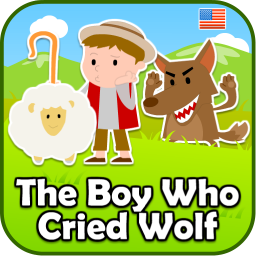The Boy Who Cried Wolf!
There was once a boy who lived in a village up in the mountains. His family owned many sheep. The boy had a job, and that job was to watch the sheep. If a wolf came near, he needed to call for help. His sheep stayed on a hill near the village where he watched them every day.
One day, he thought of a trick he could play on the people who lived in the village. He was bored, so he thought this would be a way to have fun. He ran toward the village crying out loudly for help.
He shouted, "Wolf! Wolf! Come and help! The wolves are at my lambs! The wolves are trying to eat them!"
There were many villagers in the town. They heard him crying and thought that they had to help. So, the kind villagers left their work and ran to the field to help him. They would try to help him chase away the wolves and protect his lambs. However, when the villagers got there, the boy laughed at them. There was no wolf there. He just wanted to watch them come running! He thought it was funny.
Then another day the boy tried the same trick. Once again, the villagers came running to help him out, and once again the boy laughed at them.
Then, one day, a wolf really did come and it started chasing the lambs. In great fright, the boy ran for help. "Wolf! Wolf!" he screamed. "There is a wolf! Help! Please! Help! Please!”
All the villagers heard him, but this time they did not come. They thought he was pulling another mean trick. They had learned their lesson and did not need to be laughed at again. So, no one paid attention to him and the shepherd-boy lost all his sheep –they all ran away.
When people in the village found out what had happened, they were sorry, but they told the boy it was his fault. That is the kind of thing that happens to people who lie. Even when they tell the truth, no one believes them. People are just so used to their lies.
